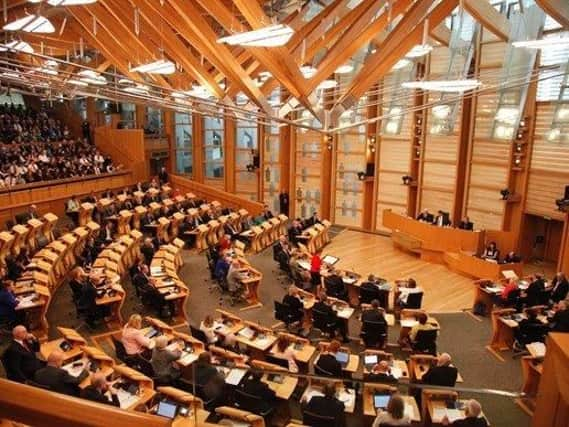Leading crime expert urges MSPs to ensure sex and gender are not conflated in Census


Professor Susan McVie, chair of quantitative criminology at Edinburgh University's School of Law and a member of the Scottish Government's Board of Official Statistics in Scotland, has made an eleventh hour submission to the Holyrood committee dealing with the Census Bill, asking that the sex question be rooted in biological and legal sex.
MSPs are today expected to pass the Census Bill which will see the next nationwide survey of the population carried out in 2021.
Advertisement
Hide AdAdvertisement
Hide AdThe Bill has proved controversial after the possibility of a "third sex" question was mooted to allow non-binary people the opportunity of avoiding saying if they were male or female. There has also been debate around whether transgender people should be able to answer the question as the gender they identify with, rather than their biological sex.
Holyrood's Culture, Tourism, Europe and External Affairs Committee which was dealing with the Bill recommended the sex question remain binary.
However it has not yet been confirmed that this will happen, as the government minister involved, Fiona Hyslop, said that the "wording of the questions" was still to be agreed".
She said the "clear direction" from the committee would be "taken into account in the next steps of developing the potential mandatory question as NRS work towards preparation of the subordinate legislation and its consideration by the Committee and Parliament in due course." Data on sexual orientation and gender identity will be gathered via a new voluntary question.
But Professor McVie, who is also a strategic advisor to Police Scotland and sits on the board of the National Society for the Prevention of Cruelty to Children, said it was vital that sex and gender not be conflated.
She had previously given evidence to the committee, but in her new letter said she wanted to provide "supplementary evidence" ahead of this afternoon's debate which is expected to see the Bill pass.
She wrote: I am fully in favour of the inclusion of new questions on gender identity and sexual orientation in the 2021 Census. It is vitally important that the Census accurately reflects thecharacteristics of the population, and how these are changing, as it has done for over 200 years.
"However, I strongly urge the Committee to support the retention of a binary sex question based on biological/legal sex. Sex refers to clear biological and physical characteristics and is a protected characteristic under the Equality Act 2010.
Advertisement
Hide AdAdvertisement
Hide Ad"This is a clear and separate issue from gender-identity, which is a much more complex social construct that is underpinned by a range of physical, social, psychological and cultural factors."
She said that as a statistician and researcher it was important to have "clearly defined data on both sex and gender identity" so aspects of discrimination and inequality related to both are able to be recorded.
She added: "Sex is a fixed characteristic, while gender-identity is more fluid and changeable. To properly understand how people's lives change and are impacted by the world around them, it is important to be able to take account of both fixed and static factors (such as sex) and more dynamic characteristics (like gender-identity). To be able to properly understand this, we need clearly differentiated data on both sex and gender-identity."
Professor McVie also said that to ensure people get access to the services that best meet their needs whether they are male or female. "These are likely to continue to exist even when someone changes their gender- identity. If we do not have accurate information about both sex and gender identity, we may miss important details about how people's lives are affected by inappropriate or ineffective service delivery."
Pointing to recent reports that sex and gender are already being recorded as the same thing by public bodies, including Police Scotland, she said MSPs must give "careful consideration" to making a clear statement to public bodies in relation to recording sex and gender separately.
She said: "For some aspects of routine activity, this will make no material difference to policing practice. However, as Police Scotland data is used for the collation of official and national statistics, that are published annually by the Scottish Government, the lack of clarity over these data will impact on the measurement and presentation of the picture of ‘crime’ in Scotland.
"It will have a particular impact on the accuracy of official measures of crimes that are sex-related (such as Group 2 Sexual Crimes) and on those for which there are very low levels of recorded offending amongst women.
"While I appreciate that this is a very sensitive topic, I hope that the Scottish Parliament advocates a sensible and evidence-based approach to both the design of the Scottish Census and to the collection of important socio-demographic information by public bodies. The collection of accurate data about our population is essential in terms of enabling robust and valid research, supporting the development of effective services, and tackling areas of discrimination and inequality that continue to exist in society today.
Advertisement
Hide AdAdvertisement
Hide Ad"The conflation of sex and gender identity goes against existing inequalities legislation and risks the construction of inaccurate and corrupted data that are not fit for the purposes for which the Census and other official data sources are required."
Fiona Hyslop, recently said: “The census will be taking a leading role gathering evidence to provide support and protection for Scotland’s transgender population.”
